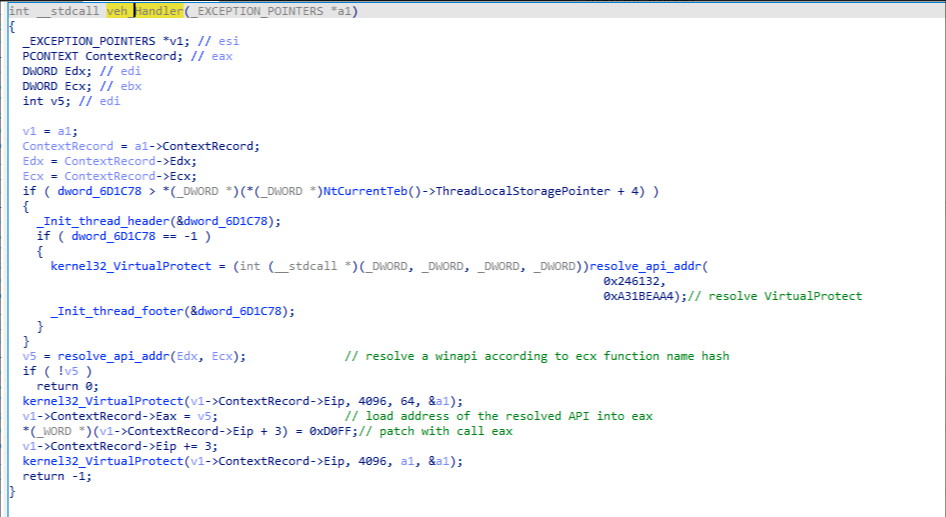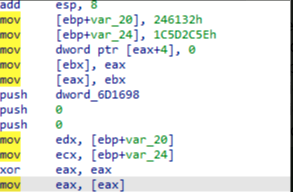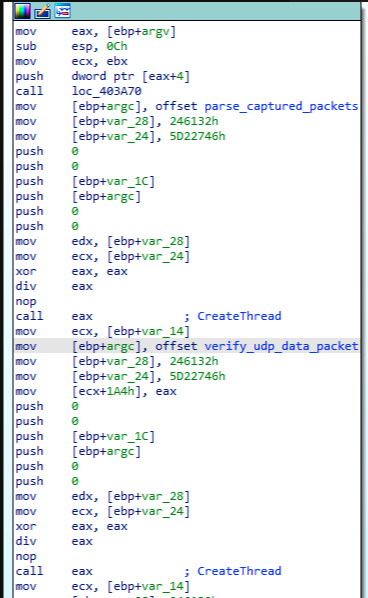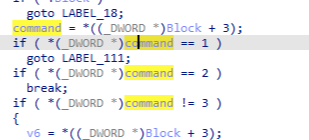Flare-on8 challenge 9
Please read the disclaimer
A quick static analysis of the binary main function shows invalid instructions between valid ones, we notice the use of instructions that will eventually generate an exception example :
xor eax, eax
div eax
An experienced malware analyst will recognize the obfuscation technique were the binary registers exception handler(s) (SEH or VEH) that patch the code at run time and restore the execution flow.
Using TinyTracer https://github.com/hasherezade/tiny_tracer by @hasherezade, I noticed the use of addvectoredexceptionhandler WINAPI, to make static analysis easier we can load the .tag file to IDA PRO.

VEH handler analysis

Thanks to Tinytracer comments, we notice that the function 0x4054b0 fetch the address of VirtualProtect, it takes 2 parameters that look like hashes. a deeper analysis shows that this function is used to dynamically import functions were the second argument is the hash of the functon name.
We notice a second call to 0x4054b0 function with edx, and ecx as arguments, going back to the main function before the exception occurred we see the 2 hashes are loaded into ecx, and edx.

the return value (a function pointer) is written to ContextRecord->eax.
Next a call to VirtualProtect to set the memory writable followed by a patch at offset EIP+3 with the opcode call eax (0XD0FF) then increments ContextRecord->EIP by 3 and finally calls VirtualProtect to remove the write attribute.
I wrote the following python script to fix the code and get a clean disassembly view for static analysis
from idautils import *
from idaapi import *
from idc import *
#list of used instructions that generate exceptions
#33 FF F7 F7
#33 C0 8B 00
#33 C0 f7 f0
#33 F6 F7 F6 xor esi, esi ; div esi
seg = get_segm_by_name(".text")
addr = seg.start_ea
end_seg = seg.end_ea
a = [0xf7f7ff33, 0x008bc033, 0xf0f7c033, 0xf6f7f633]
while addr < end_seg:
if ida_bytes.get_dword(addr) in a:
print(hex(addr))
ida_bytes.patch_word(addr+5, 0xd0ff)
ida_bytes.patch_byte(addr+4, 0x90)
addr += 1
Anti reverse engineering techniques
We can notice the usage of different anti reverse engineer techniques, I will enumerate some of them:
- Check of hardware breakpoints
- Patch DbgUiRemoteBreakin DbgBreakPoint
- Check PEB BeingDebugged flag
We can bypass the anti reverse engineer techniques by noping or overstepping ( I will not go in details due to time restriction).
Network packet sniffing

The function 0x403a70 configure a network listener in promiscuous mode on the interface given as ARGV[1].
After that a thread is created to execute the function 0x404310. This function parses the incoming packets looking for UDP packets on port 4356 with specific flags set. If the checks are successful, the UDP data is written to a structure that will be read by another thread executing the function 0x404310.
Analysing the function 0x404310
The function has basically 3 blocks of instructions that will be executed according to the first Dword of the UDP data packet (0x0, 0x1, 0x2).

Command #0:
This command decrypts a fake flag from memory, we can dismiss it.
Command #1:
This command expects another Dword followed by a string, the Dword is the size of the string (including \x00) Then 4 interesting keywords are decrypted g0d, L0ve, s3cret and 5Ex. a routine checks if the input is equal to one of the keywords, if yes, it will calculate the hash of the string and save it to a buffer. In total we will have 4 buffers holding the hash of each keyword.
Command #2:
And finally the last command also expects a Dword (size of string) and the string MZ.
It uses the buffers populated with the previous hashes to decrypt the flag.
Using netcat and python we can get the flag with the following commands
python -c 'print "\x02\x00\x00\x00" + "\x04\x00\x00\x00" + "g0d\x00"' | nc -u 172.16.45.128 4356
python -c 'print "\x02\x00\x00\x00" + "\x04\x00\x00\x00" + "5Ex\x00"' | nc -u 172.16.45.128 4356
python -c 'print "\x02\x00\x00\x00" + "\x07\x00\x00\x00" + "s3cret\x00"' | nc -u 172.16.45.128 4356
python -c 'print "\x02\x00\x00\x00" + "\x05\x00\x00\x00" + "L0ve\x00"' | nc -u 172.16.45.128 4356
# get flag
python -c 'print "\x03\x00\x00\x00" + "\x03\x00\x00\x00" + "MZ\x00"' | nc -u 172.16.45.128 4356